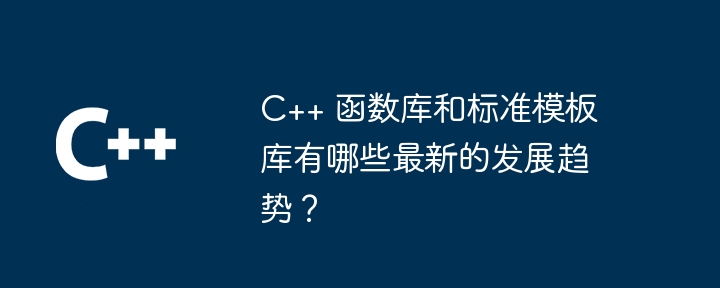c++++ 函数库和 stl 的最新发展趋势包括:标准化交叉平台库(跨平台文件操作、时间测量和随机数生成)、可并发性(原子操作、共享内存和互斥锁),stl 改进(范围库、概念和模块化)。

C++ 函数库和标准模板库的最新发展趋势
引言
随着 C++ 语言不断发展,其函数库和标准模板库 (STL) 也在不断演进,提供更多的功能和便利性。本文将概述 C++ 函数库和 STL 的最新发展趋势,并提供实战案例。
函数库的演进
立即学习“C++免费学习笔记(深入)”;
- 标准化交叉平台库:C++20 标准引入了几个新的标准化交叉平台库,包括std::chrono(用于时间测量)、std::filesystem(用于文件系统操作)和std::random(用于随机数生成)。
- 可并发性:C++11 中引入了并行标准线程库(STL),而 C++20 进一步增强了可并发性支持,包括原子操作、共享内存和互斥锁。
STL 的改进
- 范围库:范围库是一种现代化的 C++ 编程范例,它提供了更简洁、更灵活的方式来遍历和操作容器。
- 概念:C++20 引入了概念,允许开发者声明函数和类型约束,这提高了代码的可读性和可维护性。
- 模块化:C++20 引入了模块支持,允许开发者在隔离的代码单元中组织大型项目。
实战案例
标准化交叉平台库:
#include <filesystem>
int main() {
// 获取当前工作目录
std::filesystem::path current_path = std::filesystem::current_path();
// 创建一个新的文件
std::filesystem::create_directory("new_directory");
return 0;
}可并发性:
#include <thread>
#include <vector>
int main() {
// 创建一个线程向量
std::vector<std::thread> threads;
// 为每个线程创建一个任务
for (int i = 0; i < 4; i++) {
threads.push_back(std::thread([] () { std::cout << "Thread " << std::this_thread::get_id() << std::endl; }));
}
// 等待所有线程完成
for (auto& thread : threads) {
thread.join();
}
return 0;
}范围库:
#include <algorithm>
#include <iostream>
#include <vector>
int main() {
// 创建一个整数向量
std::vector<int> v = {1, 2, 3, 4, 5};
// 使用范围库算法对向量进行操作
for (auto x : v | std::views::filter([] (int x) { return x % 2 == 0; })) {
std::cout << x << " ";
}
return 0;
}概念:
#include <concepts>
template <typename T>
concept NumericConcept = requires(T x, T y) {
{ x + y } -> std::same_as<T>;
{ x - y } -> std::same_as<T>;
{ x * y } -> std::same_as<T>;
};
int main() {
static_assert(NumericConcept<int>); // 编译时确保 int 满足概念
static_assert(!NumericConcept<std::string>); // 编译时确保 std::string 不满足概念
return 0;
}模块化:
// main.cpp
import module;
int main() {
my_function();
return 0;
}
// module.cpp
export void my_function() {
std::cout << "Hello from the module." << std::endl;
}


